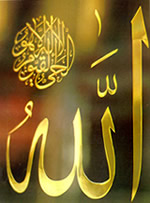Where Is Allah

1- What I realize through my senses I cannot doubt its existence
This is a rational spontaneous intuition which is taken for granted, but what is witnessed is that when one walks, at midday, in the desert and sees a pond of water at a remote distance, but when he reaches it, he will discover that is a dust because what he saw was a mirage. By the same token, when one puts the straight pen in a cup of water, he will see it as if it is broken, but really it is not. If someone was at an evening party in which people talked about Jinn and ghosts, on his way home, because the road was dark and empty and if he was scared and had an active imagination, he may have thought he saw a Jinn or a ghost, but in fact it was nothing other than his imagination. The magicians and tricksters display strange things which we see, but they have no reality. Therefore, the senses can make mistakes and be deceived, they can imagine or their owner can imagine, but is this a reasonable cause to doubt the existence of what one realizes?
No, because if I doubt what I hear, see, or realizes, my reality will be confused with my imagination and I will be like an insane person.
Here, there is another prerequisite to attain the knowledge edge (conviction) that what I realize is existed i.e. the mind should not decree according to the previous experiment and consider it as a basis of conviction. What I felt (realized) in the beginning was an imagination or an illusion of the sense. In the first case, the mind was deluded, it thought the mirage to be water, the pen was still straight although it seemed as if it was broken. The matters in which the senses were mistaken or deluded were definite and well known. This does not invalidate or affect the rule. Amongst these things are the magic done by the magicians of Pharaoh and what is done by magicians in circus nowadays.
The Basics of Creed
There are many things which we do not see or realize, but we have the conviction that they exist as if they were things which we could see and realize. We believe that there are countries called India and Brazil although we have never visited or seen them before. We believe that Alexander the Great had conquered Persia and that Walid Ibn Abd Al-Malik had built the Umayyad Mosque, although we did not participate in the wars of Alexander nor did we witness the building of Umayyad Mosque. If every one of us contemplates in himself, he will discover that his belief in things which he has not seen are more than what he has seen of kingdoms, countries and historical events whether they have taken place in the past or take place in the present. Why did he believe in the existence of all these things although he did not realize them with his senses? Man believes in the existence of these things because they were transferred to him through the ages, generations, via communication, and what he has learnt according to the agreement among people and according to the principle of habit. So, he believes these reported events because it is impossible to belie them after the people had agreed on their authenticity.
Therefore, the second rule is as follows, conviction can be attained through realization and observation, it can be also attained from the report of the ones whom we think are truthful. The truthful people is believed by others.
- What is the extent of knowledge that can be attained by
the senses? Can senses realize every created thing?. Infact the likeness
of the self and the senses with the creatures is similar to that of a man
who is imprisoned by the ruler in the tower of a castle and blocked all ways
before him except by some splits in the wall of the tower. Through these
splits the man can look at the river in the east, at the mountain in the west,
at the palace in the north, or at the playground in the south.
In fact the imprisoned person is the “Self” and the castle is the “body” and the splits are the restricted senses. Thus, by the sense of sight the man can look at the kingdom of figures and colors, by the sense of hearing can look down the kingdom of sound, by the sense of taste he can look at the kingdom of foods, drinks and tastes, by the sense of smell he can get into the kingdom of smells, and by the sense of touch, he can get into the kingdom of bodies and sizes.
Here, a question arises, can the man, through each of these senses, realize all what this vast world contains?
When the imprisoned person looks from the split in the direction of the river, he cannot see all the river, but sees only a part of it. By the same token, when the eye looks at the kingdom of the colors, it does not see all of it, but only a part of it.2
